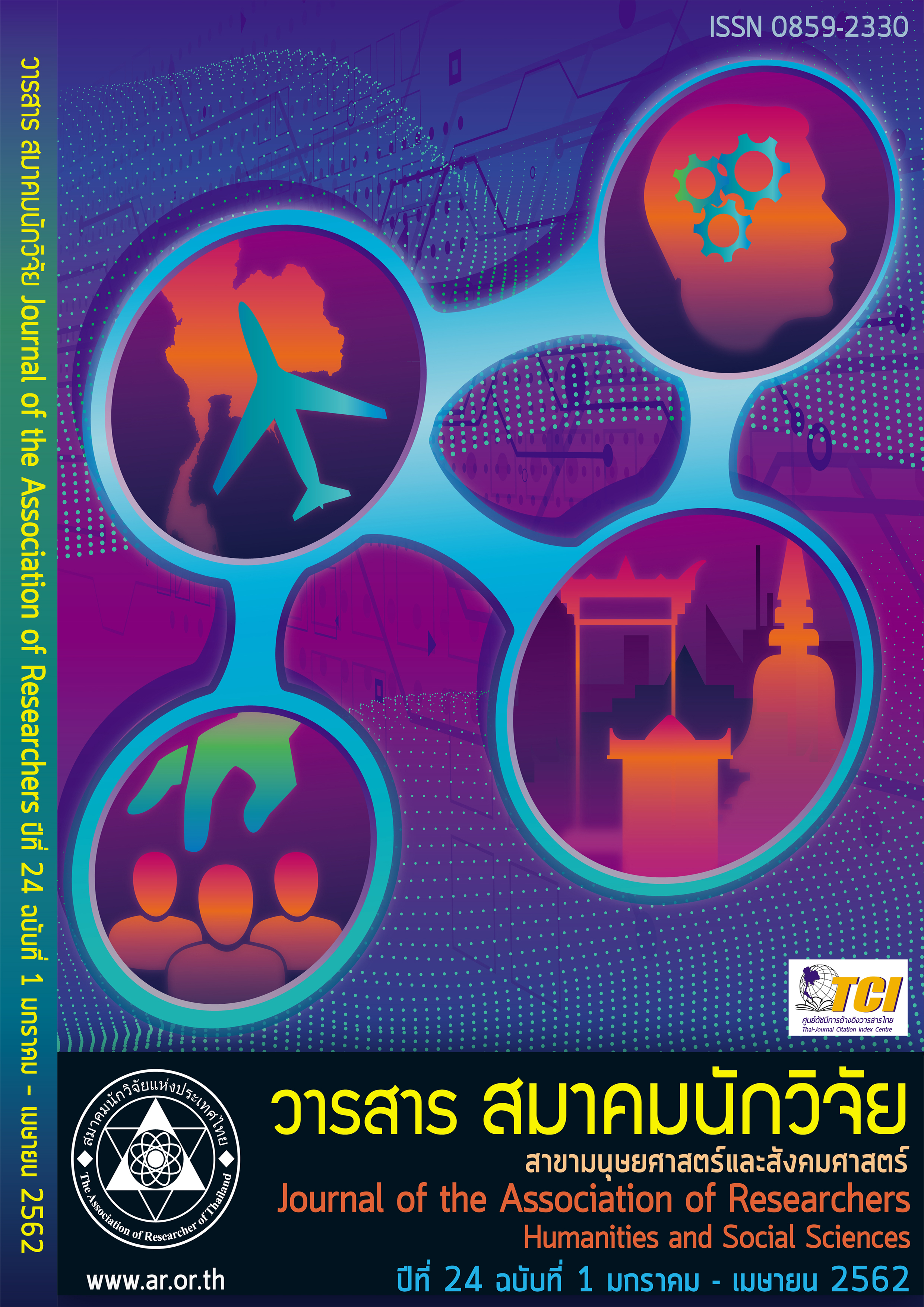Effects of Trust and Knowledge Share as Serial Mediated Variables Correlated with the Psychological Capital and the Employees’ Performance of Small Enterprise Employees in Thai Ceramic Industries in Bangkok and Bangkok Metropolitan Regions
Main Article Content
Abstract
This research aimed to investigate: (1) the psychological capital, trust, knowledge share, and employees’ performance; (2) the trust and the knowledge share as serial mediated variables correlated with the psychological capital toward the performance in small enterprise employees in Thai Ceramic Industries in Bangkok and Bangkok Metropolitan regions. This study is an exploratory qualitative research implementing a questionnaire as a research instrument to investigate a sample of 100 small enterprise employees in Thai Ceramic Industries. Statistical analyses in this research were percentage, means, standard deviations and SmartPLS 2 structural equation program. The research findings revealed that: (1) overall, the psychological capital, trust, and knowledge share were statistically averaged at a high level with = 3.65, 3.59, and 3.67 respectively. Whereas the employee performance had a total average at a moderate level ( = 3.17). (2) Based on the analysis of the serial mediated variable connecting the psychological capital and the employees’ performance, it was found that the findings of lower bounded coefficient values of trust and the knowledge share as the serial mediated variables connecting the psychological capital and the employee performance were at 0.202 and the upper bound coefficient values of them were at 0.479. Therefore, the outcomes of different studies could be established as the fundamental job performance, depending on the affective attitude to enhance the human relationship efficacy within the organizations.
Article Details
บทความที่ปรากฏในวารสารนี้ เป็นความรับผิดชอบของผู้เขียน ซึ่งสมาคมนักวิจัยไม่จำเป็นต้องเห็นด้วยเสมอไป การนำเสนอผลงานวิจัยและบทความในวารสารนี้ไปเผยแพร่สามารถกระทำได้ โดยระบุแหล่งอ้างอิงจาก "วารสารสมาคมนักวิจัย"
References
มนตรี พิริยะกุล. (2553). ตัวแบบเส้นทางกำลังสองน้อยที่สุดบางส่วน. กรุงเทพมหานคร: มหาวิทยาลัยรามคำแหง.
____________. (2558). ตัวแปรคั่นกลางและการทดสอบอิทธิพลทางอ้อม. วารสารการจัดการและการพัฒนา, 2(1), 1131.
รุ่งรดิศ คงยั่งยืน. (2560). องค์การแห่งการเรียนรู้ บรรยากาศองค์การ พฤติกรรมการเป็นสมาชิกที่ดีขององค์การและการ แบ่งปันความรู้ของหน่วยงานในฝ่ายช่าง บริษัท การบินไทย จำกัด. วารสารสมาคมนักวิจัย, 22(1), 150-162.
Abdel, M. A., Ashoush, L., & Salama, M. R. (2017). The mediating role of knowledge share in the relationship between interpersonal trust and sustainable competitive advantage. International Journal of Academic Research, 4(7), 10-18
Alawiyah, T., & Held, M. L. (2015). Social capital: Promoting health and well-being among Indonesian women. Journal of Women and Social Work, 30(3), 352-362.
Deaton, S. (2015). Social learning theory in the age of social media: Implications for educational practitioners. Journal of Educational Technology, 12(1), 1-6.
Ho, C. H., Oldenburg, B., Day, G., & Sun, J. (2012). Work values, job involvement, and organizational commitment in Taiwanese Nurses. International Journal of Psychology and Behavioral Sciences, 2(3), 64-70.
Kappagoda, U. W., Othman, H. Z. F., & Alwis, G. D. (2014). Psychological capital and job performance: the mediating role of work attitudes. Journal of Human Resource and Sustainability Studies, 2, 102-116.
Khesal, S. M., Samadi, B., Musram, H. A. M., & Zohoori, M. (2013). The impact of trust on knowledge sharing. Interdisciplinary Journal of Contemporary Research in Business, 5(2), 495-501.
Kong, F., Tsai, C. H., Tsai, F. S., Huang, W., & Cruz, S. M. (2018). Psychological capital research: A metalanalysis and implications for management sustainability. Sustainabiltiy, 10, 1-9.
Likert, R. A. (1932). A technique for the measurement of attitudes. Archives of Psychology, 140, 5-53.
Maher, A., Mahmoud, H. S., & Hefny, S. E. (2017). Authentic leadership and psychological capital: The impact on Egyptiam employees’ work well being. The Electronic Journal of Knowledge Management, 15(3), 204-212.
Nafei, W. (2015). The effects of psychological capital on employee attitudes and employee performance: A study on teaching hospitals in Egypt. International Journal of Business and Management, 10(3), 249-270
Nemati, M. (2015). Study the of organizational socialization, psychological capital, knowledge sharing and trust on employess’ tendency to organizational innovation. Applied Mathematics in Engineering, Management and Technology, 3(1), 733-742.
Nguyen, T. D., & Trang, T. M. (2012). Psychological capital, quality of work life, and quality of life of marketers: Evidence from Vietnam. Journal of Macromarketing, 32(1), 87-95.
Rehman, W., Ilyas, M., & Asghar, N. (2015). Knowledge sharing, knowledge management strategy and performance: A knowledge based view. Pakistan Economic and Social Review, 53(2), 177-202.
Smith, R. C., Vogelgesang, G., & Avey, J. (2009). Authentic leadership and positive psychological capital: The mediating role of trust at the group level of analysis. Management Department Faculty Publications, 23, 227-240.
Smuththarak, K. (2014). The problems and the needs of Ceramic Industrial Traders in Lampang Province. Industrial Technology Lampang Rajabhat University Journal, 7(1), 1-13.
Usikalu, O., Ogunleye, A. J., & Effiong, J. (2015). Organizational trust, job satisfaction and job performance among teachers in Ekiti state, Nigeria. British Open Journal of Psychology, 1(1), 1-10.
Zamahani, M., Ghorbani, V., & Rezaei, F. (2011). Impact of authentic leadership and psychological capital on followers’ trust and performance. Australian Journal of Basic and Applied Sciences, 5(12), 658-667.
Translated Thai Reference
Boonyoo, T. (2018). Mediated effects of structural capital and entrepreneurship in transmitting relational capital to the productivity for Thailand’s Gens and Jewelry Industry. Panyapiwat Journal, 1(1), 41-53. (In Thai).
Kongyoungyune, R. (2017). Learning organization, organizational climate, organizational citizenship behavior and knowledge sharing of subunits with technical department Thai airways public company limited. Journal of the Association of Researchers, 22(1), 150-162. (In Thai).
Piriyakul, M. (2010). Partial Least Square Path Modeling (PLS Path Modeling). Bangkok: Ramkhamhaeng University. (In Thai).
Piriyakul, M. (2015). Moderator and mediator in structural equation modeling. The Journal of Industrial Technology, 11(3), 11-31. (In Thai).


